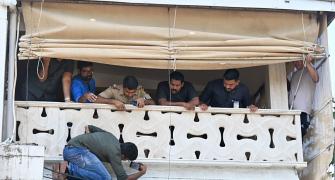Private players offer convenience for slightly higher rental than banks.
 Getting a safe-deposit locker in a bank is difficult. Many bank branches don’t even offer such services.
Getting a safe-deposit locker in a bank is difficult. Many bank branches don’t even offer such services.
And the ones which having this facility want their customers to either have a fixed deposit or an insurance policy with the bank.
Tapping this opportunity, private players have started offering the service.
The latest entrant in this space is real estate developer, Ajmera Group, which recently launched Ajmera i-Safe in Mumbai.
“The vaults are constructed as per specifications prescribed by the government and match the security features found in any bank,” said Bandish Ajmera, director, Ajmera Group. The annual charges for renting a locker at Ajmera i-Safe is between Rs 1,145 and Rs 13,740, depending on size of the locker.
While Axis Bank charges annual rent of Rs 1,500-Rs 12,000 for a locker, State Bank of India charges Rs 800-Rs 8,000, plus service tax.
Navkettan Lockers, which offers services in Hyderabad and Secunderabad, charges Rs 11,628-Rs 38,304 per year.
This includes admission fee ranging between Rs 6,000 and Rs 9,600.
Navkettan has been offering the service for 40 years now. Another such player is India Safety Vault, which has branches in Mumbai and Pune.
While going for a private locker service, a customer should ensure that the service provider is following the Reserve Bank of India norms on construction of the vault, (wall thickness, door size, grill doors, etc) and offers safety features like steel lockers, double locking system, 24-hour security guards and closed-circuit television cameras said V N Kulkarni, a former bank official and debt counselling consultant.
“In case of damage to a customer’s property, the service provider is not responsible. But that is the same for bank lockers. This is because the bank does not know what is inside the locker. Unless the customer is able to prove the value of the contents, the bank is not liable to pay,” Kulkarni said.
A customer would have to prove deficiency of service, which is difficult unless there is gross negligence on part of the bank.
Even in case of loss due to natural events like earthquake, fire, floods, etc, it is difficult to prove deficiency in service.
“Private lockers are an alternative for those who do not get a bank locker. Besides, private lockers are also convenient because they are open for longer hours and on bank holidays,” said Anil Harish, advocate and partner, D M Harish & Company.
Private lockers are not regulated by any specific authority, said Harish.
“It is a private contract and the parties are bound by the contract. So, regulation is not required. In case of any problem, customers can approach the consumer forum or file a civil case. Or, if it is a major fraud, customers can file a criminal case,” he added.
Photograph: Reuters







